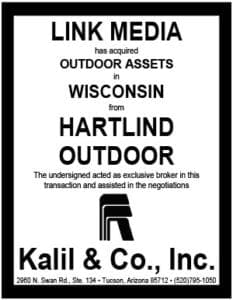Sign cases at the US Supreme Court aren’t common. But in 2015, a unanimous Supreme Court struck down a local ordinance because it treated temporary church signs differently than others.
This free speech case (Reed vs. Town of Gilbert, AZ) prompts an important question: if the Town of Gilbert’s code was too restrictive because it regulated signs based on content, are other codes also out of line?
Some billboard opponents seek to use the Reed decision to hurt billboards, by scraping existing codes and enacting severe new restrictions. If the Reed case pops up in your markets, are you ready?
The Problem in a Nutshell
Local planners claimed that the Reed case rendered Grand Junction’s sign ordinance unconstitutional. They sought to toss out the existing sign ordinance and replace it with anti-billboard rules.
Mark Gamble of family-owned Western Colorado Outdoor in Grand Junction organized a response, and prevailed.
 Insider interviewed Myron Laible of OAAA, to help prepare billboard colleagues in other markets.
Insider interviewed Myron Laible of OAAA, to help prepare billboard colleagues in other markets.
Why does the Reed case stir up trouble at the local level?
In Grand Junction, the planning department proposed a new ordinance, to drop the distinction between on-premise and off-premise signs, and also put severe limits on all signs.
How did billboard operators deal with this problem in Colorado?
Mark Gamble sounded the alarm. Working with other billboard companies (Mile High Outdoor and OUTFRONT Media), Mark and his colleagues asked the state billboard association and OAAA for help.
If you have to deal with Reed, you are not in a vacuum. OAAA has on-point, easy-to-understand materials that will help you with local officials:
- A legal opinion from Harvard Law Professor Larry Tribe, saying Reed does NOT knock out the distinction between on-premise and off-premise signs (Tribe memo 9-11-15)
- Highlighted parts of the Reed decision, where Justice Alito says sign regulations properly distinguish between day and night, lit and un-lit, electronic and non-electronic
- The US Solicitor General’s brief in the Reed case, which says the Highway Beautification Act is consistent with the First Amendment (US Solicitor brief.)
Using these materials, plus his knowledge of First Amendment law, the attorney for the state billboard association (Dick Holme in Denver) wrote a persuasive letter (click here) that said: “Reed does not justify any significant (or any) revision” of Grand Junction’s sign code regarding billboards.
What happened, in the end?
On February 1, the city council voted to leave the local billboard regulations in place. The billboard operators convinced the city that it didn’t have to hurt billboards in order to comply with the Reed decision.
Mark Gamble’s summary: “All regulations to off-premise signs have remained unchanged, as the outdoor advertising industry desired.”
Insider expects that Billboard operators should hear about the Reed case for years. Four challenges are currently pending against State billboard regulations (TX, TN, GA, and RI).
Ultimately, Reed could cause some changes to sign regulations, such as dropping narrow distinctions and exceptions based purely on content.
Meanwhile, if Reed pops up in your markets, remember these basics:
1.) Colleagues in other markets have faced this issue
2.) OAAA has experts and resources to help
3.) You can mitigate unnecessary hysteria caused by the Reed case
[wpforms id=”9787″]
Paid Advertisement

















